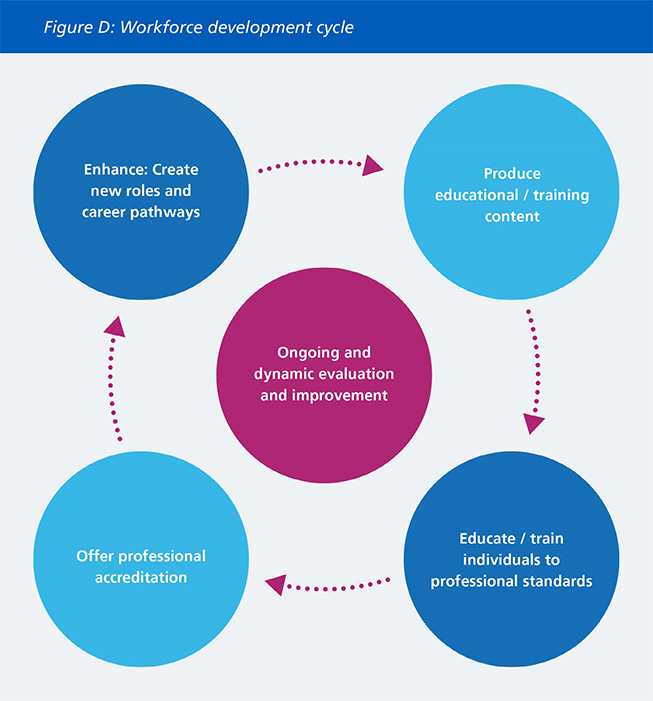The wider context and workforce transformation
Executive summaryThe wider context of workplace transformation and the change towards a digital-ready workforce.
Interviewees for this research noted that the success of artificial intelligence (AI)-related education and training will be dependent on wider requirements for transformation and change towards a digital-ready workforce.
These involve the development of novel team structures, the recruitment, training and retaining of individuals with specialist AI skills (including clinical informatics and digital, data and technology professionals), and new leadership roles that can support health settings to deploy AI technologies.
Workforce transformation, as defined by Health Education England (HEE), is a process to improve the recruitment, retainment, deployment, development and ongoing support of the healthcare workforce, to meet the growing and changing needs of local populations - ensuring high quality care for the patients of today and the future.
Workforce transformation efforts to support AI-related education and training can be grouped against the five enablers of the HEE Star framework, as illustrated in Figure C.
Specific considerations when developing Integrated Care System (ICS) workforce plans can include:
- establishment of AI multidisciplinary teams (MDTs)
- development of a plan to increase the digital, data and technical (DDaT) data family workforce to meet future demand. This can include new clinical informatics specialist roles, supported training opportunities, upskilling existing staff into technical roles and joint digital/clinical training opportunities for clinical staff. If deemed necessary, it could also include routes for external expertise to be brought into the healthcare sector
- creation of senior (non-managerial) technical roles with expert AI-related knowledge and skills
- expansion of professional digital leadership positions to lead AI development and deployment
Figure C: Workforce transformation to support AI-related education
Developing and sustaining specialist AI-related skills will require the development of appropriate education, accreditation and career pathways as illustrated in Figure D. This should be supported by ongoing and dynamic evaluation and improvement of educational efforts, professional accreditation routes and career pathways.
Current initiatives that address aspects of this workforce development cycle include Health Education England establishing the Data Science Programme, industry roundtables that explore the potential for collaborative training opportunities with academia and industry innovators, and the creation of Informatics Skills Development Networks (ISDNs).
Further, the ‘Data saves lives’ strategy outlines existing efforts to build analytical and data science capabilities, including building the profile of data and analysis as a profession through competency frameworks, networks, training, career opportunities and status, and the work of the Developing Data and Analysis as a Profession Board. Current initiatives include the NHSE Digital Workforce Programme within the System CIO/Director of Levelling-up Directorate, and the development and testing of a National Competency Framework for Data Professionals in Health and Care that will include a set of core competencies for health and care data professionals.

A key part of this report’s suggested educational approach involves continuation of the broader efforts to enable change and innovation in healthcare settings, as well as efforts to advance digital skills and capabilities within the workforce as important foundations for specific education and training in AI. When considering wider digital health and data-driven technology education, it may be appropriate to apply the approach this report has taken to structure the workforce into archetypes.
Digital infrastructure and organisational digital maturity are also key enablers of transformation through data-science and AI, without which large-scale adoption of AI technologies will not be possible.
These broader efforts should be considered a priority that will support educational and training offerings to develop healthcare workers’ confidence in AI.
Page last reviewed: 17 April 2023
Next review due: 17 April 2024